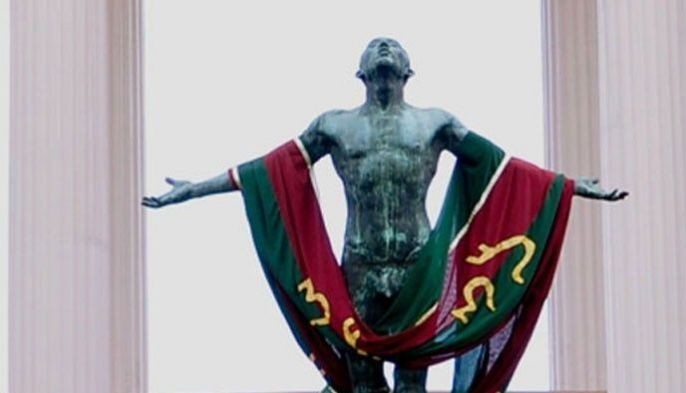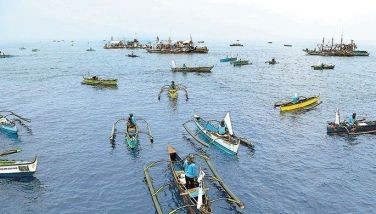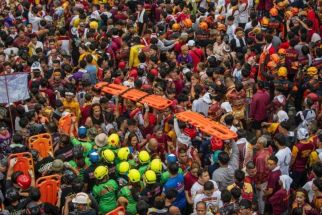Aussies concerned about JI presence in Mindanao
October 18, 2005 | 12:00am
ZAMBOANGA CITY — Australia is worried about the presence of Indonesia-based Jemaah Islamiyah (JI) terrorists in Mindanao.
Speaking to reporters yesterday, said: "We are obviously focusing on the Southern Philippines because we are worried about the possible infiltration of the JI into Philippines, specifically Mindanao. The JI is a threat to the whole region, including to ourselves," visiting Australian Defense Minister Robert Hill told reporters at the military’s Southern Command (Southcom) headquarters here.
At Malacañang, Press Secretary Ignacio Bunye welcomed yesterday Australia’s offer to carry out "cooperative" sea patrols in Philippine waters, especially the South, to stop the movement of terrorists.
"We welcome overtures from Australia for sea patrol cooperation under the principles of mutuality and sovereignty," he said in a statement.
"We must combine all the tools to fight terror — global cooperation and grassroots vigilance — with a strong anti-terrorism bill that will facilitate the detection of terrorist cells, make them easier to arrest and keep them from executing their evil task."
However, Bunye did not say if armed Australian naval vessels would be patrolling the waters of Luzon, Visayas or Mindanao, or whether they would be docked in any particular port in the country.
He was also silent on whether Hill had made the offer to President Arroyo, or if he had mentioned it to Southcom chief Lt. Gen. Edilberto Adan when they met at the Southcom headquarters.
It is not also clear how the "coordinated" sea patrols between the Philippines and Australia, which Bunye mentioned, would be conducted because the two countries have no common border.
A contingent of Australian Special Forces troops are now undergoing training with Filipino soldiers in Mindanao.
Hill is expected to meet separately with Mrs. Arroyo and Defense Secretary Avelino Cruz Jr. to discuss ways that Australia can help in reforming the Philippine Armed Forces.
Hill said Australia is eager to help the Philippines fight terrorism. "It’s a question now of firming up the data and putting it on the ground," he said.
Hill said Australia and the Philippines are to expand security cooperation amid concern over JI terrorists in Mindanao.
"(There could also be) further training and support for special forces, particularly in long-range reconnaissance work," he said.
Australia has been actively helping governments in the region track down members and leaders of JI, which has been blamed for this month’s bomb attacks in Bali that left 20 people dead.
It has also been blamed for the October 2002 bomb attacks at the Indonesian resort island that killed 202 people, many of them Australian tourists.
Regional intelligence officials as well as the US government believe that two JI bombers wanted for the Bali bombings are hiding out in Mindanao.
The US government has offered an $11-million bounty for information leading to the capture of JI leaders Dulmatin and Umar Patek, who are believed to be receiving protection from the Abu Sayyaf under Khaddafi Janjalani.
On Monday, a soldier was killed and four others wounded in a raid against Abu Sayyaf militants near the island of Sacol off Zamboanga City, just hours before Hill arrived.
The casualties were all members of the military intelligence command who took part in the raid.
Navy commandos also assisted in the raid, but it was not known if any terrorists were arrested, killed or wounded.
Hill also paid courtesy call on Zamboanga City Mayor Celso Lobregat before inspecting a Coast Guard patrol boat that was acquired by the government through a soft loan last year.
The Southcom said there are about 82 JI members believed to be operating in Mindanao, and about 500 al-Qaeda-linked Abu Sayyaf members.
The Philippines and Australia will boost intelligence exchanges and maritime surveillance, focusing on the infiltration of JI terrorists into Mindanao.
The United States maintains a team of Special Forces advisers to train Filipino soldiers on Mindanao and nearby islands.
Sen. Manuel Villar Jr. filed an anti-terrorism bill before Congress went on recess on Oct. 24 because he does not want the legislature to be blamed for dragging its feet if another attack occurs.
"I filed it because I don’t want to be blamed in case another terror attack happens and we still don’t have any law against terrorism," he said.
Villar, who chairs the Senate committee on public order and illegal drugs, said he issued the statement amid criticisms that the political stalemate between Malacañang and the Senate was stalling legislation.
Villar was praised by Mrs. Arroyo last week for raising the "urgent need" to pass an anti-terror law.
In convincing his colleagues to support his bill, Villar said the timing for an anti-terrorism law may be bad, but the need for it is real.
"Terrorists are becoming more and more aggressive," he said. "While we are busy with our lives, they are still free to roam around in our midst. Thus, the urgent need for an anti-terrorism law."
The bill also seeks to impose the death penalty on convicted terrorists whose crimes resulted in deaths and massive destruction of property.
A penalty of life imprisonment and a P10-million fine are proposed for convicted terrorists in cases where no person has been killed. — With Paolo Romero, Christina Mendez, AFP
Speaking to reporters yesterday, said: "We are obviously focusing on the Southern Philippines because we are worried about the possible infiltration of the JI into Philippines, specifically Mindanao. The JI is a threat to the whole region, including to ourselves," visiting Australian Defense Minister Robert Hill told reporters at the military’s Southern Command (Southcom) headquarters here.
At Malacañang, Press Secretary Ignacio Bunye welcomed yesterday Australia’s offer to carry out "cooperative" sea patrols in Philippine waters, especially the South, to stop the movement of terrorists.
"We welcome overtures from Australia for sea patrol cooperation under the principles of mutuality and sovereignty," he said in a statement.
"We must combine all the tools to fight terror — global cooperation and grassroots vigilance — with a strong anti-terrorism bill that will facilitate the detection of terrorist cells, make them easier to arrest and keep them from executing their evil task."
However, Bunye did not say if armed Australian naval vessels would be patrolling the waters of Luzon, Visayas or Mindanao, or whether they would be docked in any particular port in the country.
He was also silent on whether Hill had made the offer to President Arroyo, or if he had mentioned it to Southcom chief Lt. Gen. Edilberto Adan when they met at the Southcom headquarters.
It is not also clear how the "coordinated" sea patrols between the Philippines and Australia, which Bunye mentioned, would be conducted because the two countries have no common border.
A contingent of Australian Special Forces troops are now undergoing training with Filipino soldiers in Mindanao.
Hill is expected to meet separately with Mrs. Arroyo and Defense Secretary Avelino Cruz Jr. to discuss ways that Australia can help in reforming the Philippine Armed Forces.
Hill said Australia is eager to help the Philippines fight terrorism. "It’s a question now of firming up the data and putting it on the ground," he said.
Hill said Australia and the Philippines are to expand security cooperation amid concern over JI terrorists in Mindanao.
"(There could also be) further training and support for special forces, particularly in long-range reconnaissance work," he said.
Australia has been actively helping governments in the region track down members and leaders of JI, which has been blamed for this month’s bomb attacks in Bali that left 20 people dead.
It has also been blamed for the October 2002 bomb attacks at the Indonesian resort island that killed 202 people, many of them Australian tourists.
Regional intelligence officials as well as the US government believe that two JI bombers wanted for the Bali bombings are hiding out in Mindanao.
The US government has offered an $11-million bounty for information leading to the capture of JI leaders Dulmatin and Umar Patek, who are believed to be receiving protection from the Abu Sayyaf under Khaddafi Janjalani.
On Monday, a soldier was killed and four others wounded in a raid against Abu Sayyaf militants near the island of Sacol off Zamboanga City, just hours before Hill arrived.
The casualties were all members of the military intelligence command who took part in the raid.
Navy commandos also assisted in the raid, but it was not known if any terrorists were arrested, killed or wounded.
Hill also paid courtesy call on Zamboanga City Mayor Celso Lobregat before inspecting a Coast Guard patrol boat that was acquired by the government through a soft loan last year.
The Southcom said there are about 82 JI members believed to be operating in Mindanao, and about 500 al-Qaeda-linked Abu Sayyaf members.
The Philippines and Australia will boost intelligence exchanges and maritime surveillance, focusing on the infiltration of JI terrorists into Mindanao.
The United States maintains a team of Special Forces advisers to train Filipino soldiers on Mindanao and nearby islands.
"I filed it because I don’t want to be blamed in case another terror attack happens and we still don’t have any law against terrorism," he said.
Villar, who chairs the Senate committee on public order and illegal drugs, said he issued the statement amid criticisms that the political stalemate between Malacañang and the Senate was stalling legislation.
Villar was praised by Mrs. Arroyo last week for raising the "urgent need" to pass an anti-terror law.
In convincing his colleagues to support his bill, Villar said the timing for an anti-terrorism law may be bad, but the need for it is real.
"Terrorists are becoming more and more aggressive," he said. "While we are busy with our lives, they are still free to roam around in our midst. Thus, the urgent need for an anti-terrorism law."
The bill also seeks to impose the death penalty on convicted terrorists whose crimes resulted in deaths and massive destruction of property.
A penalty of life imprisonment and a P10-million fine are proposed for convicted terrorists in cases where no person has been killed. — With Paolo Romero, Christina Mendez, AFP
BrandSpace Articles
<
>
- Latest
- Trending
Trending
Latest
Trending
Latest
Recommended
January 10, 2025 - 12:00am






























